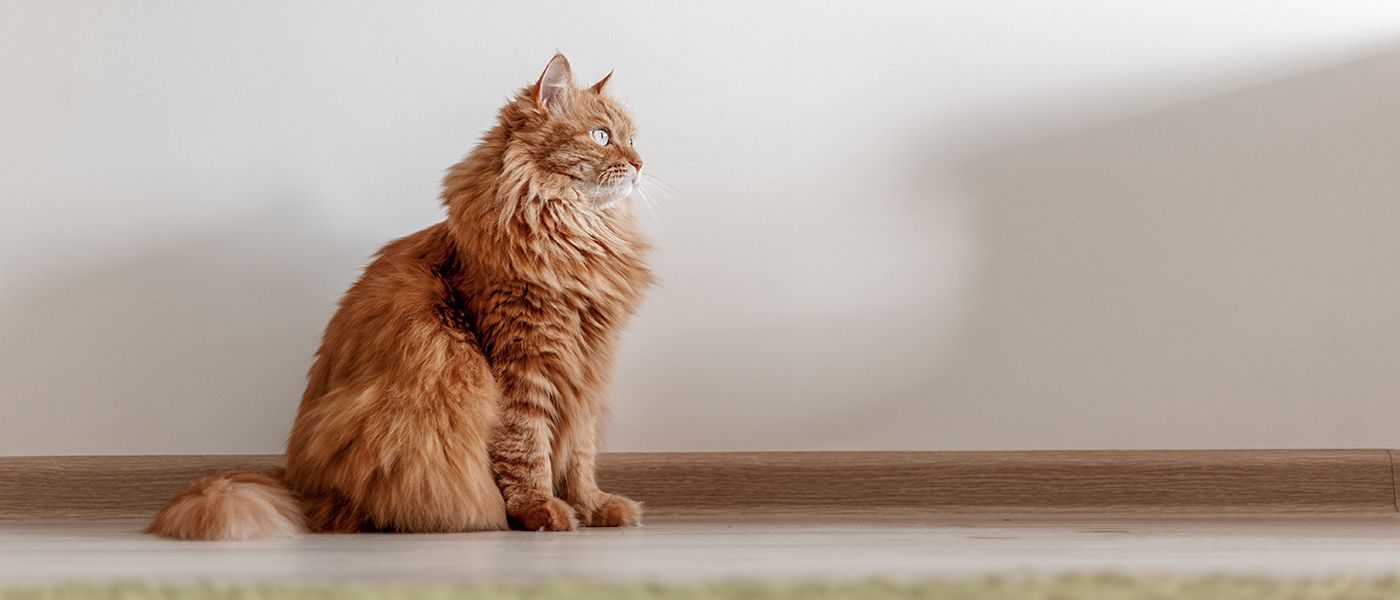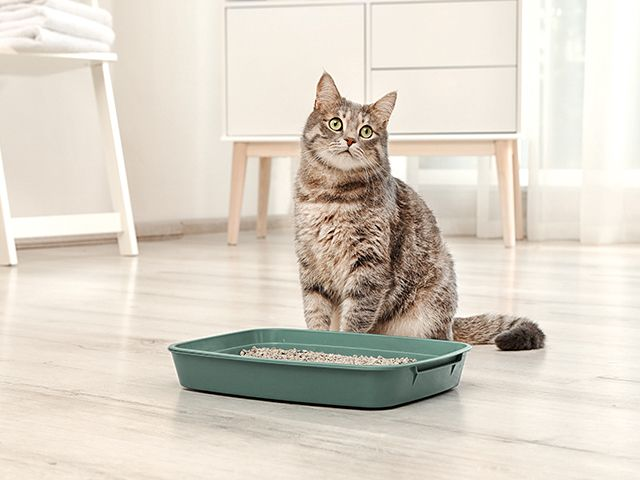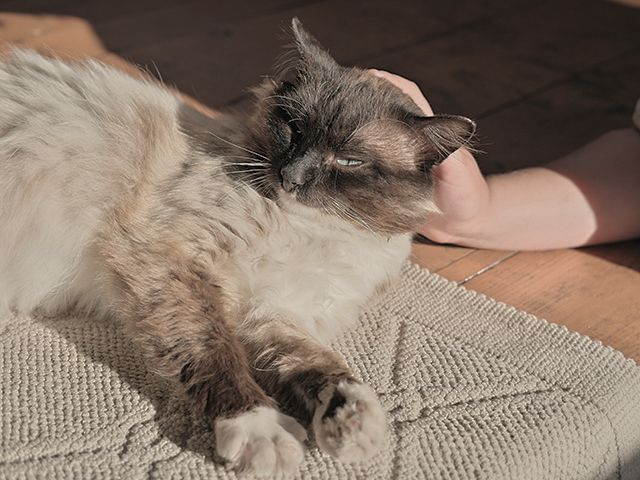Why Is My Cat Peeing Everywhere?
Article

Your cat may feel stressed, their litter box may be unsuitable, or they may have a medical condition that’s causing them to experience incontinence or bladder problems.
Here, we look at the most common causes of cat urine accidents, share tips on how to make your cat’s litter box more inviting, and offer advice about cleaning and removing the smell of urine from your home.

Why is My Cat Peeing Outside Litter Box
If your cat is experiencing litter box issues, the vet should be your first point of call. They can examine your cat and offer guidance to help narrow down the potential causes of peeing outside the litter box which may include:
Existing Medical Conditions
Several health problems can lead to excessive or inappropriate urination. Collectively, these are known as Feline Lower Urinary Tract Disease or FLUTD.
Some of the most common FLUTD issues are:
- Feline Idiopathic Cystitis (FIC). FIC often occurs as a response to stress, which then leads to urinary issues.
- Bladder Stones. As well as causing inflammation, bladder stones may lead to blockages within the urinary tract. Blockages are a medical emergency, so if your cat cannot urinate or urinate comfortably, you need to contact your vet immediately.
- Urethral Plugs. A cat’s urethra can sometimes become blocked by a build-up of waste products which can prevent urination.
- Urinary Tract Infection (UTI). When a cat’s urinary tract suffers from a bacterial infection, it becomes inflamed. If you’d like to learn more, see our guide to Urinary Tract Infection (UTI) in Cats.
As well as FLUTD, other conditions may affect a cat’s urinary system, such as:
- Endocrine Disorders. For example, diabetes or hyperthyroidism.
- Kidney Disease. If a cat is peeing frequently and drinking water excessively, it could indicate chronic kidney disease. This serious health condition typically affects elderly cats. You can discover more in our article Chronic Kidney Disease in Cats.
- Joint Pain. Older cats may experience stiffness and mobility issues that prevent them from easily accessing their litter box.
The signs associated with these health conditions vary. If your cat is having litter box issues, and you notice straining, frequent urination or a sudden change in their behavior, they may have a medical concern.
Any departure from normal behavior can be a sign of a medical problem in a cat.
Some of the more common behavioral changes that may be associated with a medical problem include inappropriate elimination, hiding, avoidance, increased clinginess, aggression, or vocalization.
If a cat is experiencing painful urination because of one of these health issues, they can sometimes associate their discomfort with the litter box, which may lead to them urinating elsewhere.
Behavioral Causes Resulting from Stress
Cats are sensitive to changes in their home environment that can lead to stress. So, if your cat is suddenly peeing outside the litter box, it could be a sign that they feel stressed, anxious, or frustrated.
Changes in the home, both large and small, may trigger a stress reaction. Be particularly aware of the following:
- A new pet, baby, or person moving in
- Visitors
- Moving to a new home
- Separation anxiety
- Loud noises, such as storms or construction work
- Celebrations, such as birthdays, the holidays and other occasions
- Changes to routine
- Local cats visiting the windows
- A conflict with other household pets
Knowing in advance when stressful situations could occur means you can try to shield your cat from known triggers.
Being aware of your cat's behavior during events or occasions can also help you spot the signs of stress, as you may notice behavioral changes alongside inappropriate elimination. They may groom themselves more than usual, become very vocal, or show signs of aggression such as growling, hissing, and biting.
Cats that have been diagnosed with Feline Idiopathic Cystitis (FIC) are thought to have an over-active stress response, which makes them particularly susceptible to urinary issues, including peeing outside the litter box.
If your cat is urinating inappropriately, it’s possible that the problem is being caused by both a medical and a behavioral issue. Each condition will need to be professionally addressed to re-establish good litter box habits.
Read our article, How to Recognize Stress in Cats to learn more.
Litter Box Issues
In some situations, it’s the litter box itself that’s the problem.
As individuals, cats have their own litter box preferences. Most cats prefer large open litter boxes.
Some are happy to use automated self-cleaning boxes, while others will shy away from noisy boxes.
Cats can also be very choosy about their litter. Cats generally prefer unscented, clumping litter. If they’re averse to a certain type of litter, they’ll spend less time digging and covering up what they eliminate and choose a spot elsewhere.
Cleanliness also plays a big part. If the litter box is dirty, a cat will naturally find somewhere else to go.
Discovering your cat’s own litter box preferences will take time, but alongside environmental changes and some positive reinforcement, you may be able to correct their habits.
How Can I Get My Cat to Urinate in the Litter Box?
A vet can help you identify the reasons behind your cat’s inappropriate urination. If it’s the result of a medical and/or behavioral issue, they’ll be able to recommend the best course of action.
However, there are some simple steps you can take around your home to encourage your cat back to the litter box:
- Get the right litter box. Typically, indoor cats prefer a large box that lets them turn around easily. If you can, try to find one that’s around 1.5 times their body length from nose to tail. However, some cats are picky about their box, so you may need to do some testing to find the one that’s right for them.
- Find their ideal litter substrate. There are many types of litter available, and your cat will probably have one they prefer. Many cats seem to enjoy an unscented, fine, granular clumping litter. Similar to choosing a litter box, you may have to try a few different options to find one that suits your cat.
- Have enough litter boxes. You should aim to have a minimum of one litter box, for each cat in your home, plus one extra box. This will ensure a choice of boxes and reduce the chances of competition.
- Pick the perfect spot. Place your litter box in an easily accessible, actively used area in your home. Avoid high-traffic or noisy locations like the laundry room. If you have an elderly cat or a cat with mobility issues, make sure the litter box isn’t too hard to reach. Use either a box with low sides or climbing stairs to help them in and out of the box.
- Keep the litter box clean. A dirty litter box encourages your cat to urinate elsewhere. So be sure to clean out the litter box every day and completely replace the litter every 1-2 weeks. When you wash the box out, use soap and warm water rather than harsh or ammonia-based cleaning products. Litter box liners can help with cleaning, but cats sometimes get their claws stuck in them, which can cause stress.
- Easy access. If your cat is elderly or struggling with mobility, making sure their litter box is accessible will make it easier for them to urinate in the litter box. Look for litter boxes with a low opening, as this will help your cat get in and out when needed.
As well as improving your cat’s litter box experience, you can make environmental changes to help ease their anxiety and enhance their mental wellbeing.
Environmental Enrichment Ideas for Cats with Urinary Issues
First, try to limit their exposure to the things that cause them stress. For example, that might mean addressing conflicts between your cats by adding extra litter boxes or feeding stations around the house.
Next, look at your cat’s indoor environment. Is there enough there to keep them occupied? Can they climb, jump, chase, hunt, scratch, and play?
If not, it’s quite possible that their behavior is down to boredom, stress, or frustration. Consider introducing:
- Climbing shelves, structures, and perches
- Boxes and hiding areas
- Self-play toys, such as motorized mice
- Toys that you can use to play with your cat
- Food dispensing toys (try as an alternative to feeding from bowls)
- Training sessions. Use a clicker to teach tricks
Download the guide to learn more about your cat's environmental needs here.

How to Remove the Smell of Cat Urine
If your cat is having accidents and there’s a bad urine smell in your home, try to stay calm and focus your energy on encouraging good litter box habits. Speak to your vet, as they will be able to make recommendations and offer support.
When it comes to cleaning up urine, it’s important to wash the affected area thoroughly. Otherwise, your cat may return to the same spot again.
Read our article How to Get Rid of the Smell of Cat Pee to find out how to carefully clean areas where your cat has had an accident.
Find a vet
If you have any concerns about your cat’s health, consult a vet for professional advice.
Like & share this page